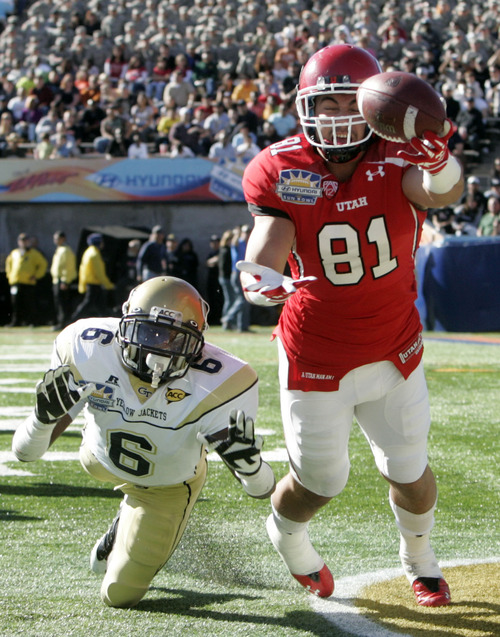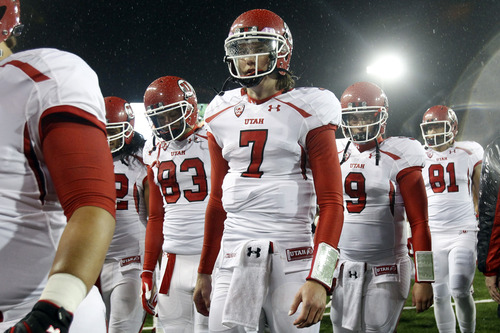This is an archived article that was published on sltrib.com in 2012, and information in the article may be outdated. It is provided only for personal research purposes and may not be reprinted.
Utah tight end Kendrick Moeai remembers how the Utes celebrated their 2009 Sugar Bowl win over Alabama and how all the players believed they'd finally done it.
They'd proven Utah's 2005 Fiesta Bowl win wasn't a fluke and that a mid-major team could succeed against the big boys of the BCS.
Now, well, all those celebrations, awards and parades seem long ago as the Utes acknowledge they're finding out playing in the BCS is indeed a whole other league.
"We didn't know what to think, coming into the Pac-12," Moeai said. "But this is hard. You have to kind of expect it, but it's still hard."
Moeai is one of just a handful of players remaining on Utah's roster who were on the 2008 team. They all redshirted, but they all also got a taste of what they thought life in the BCS would be like by participating on the scout team and taking part in all the off-field festivities that came with Utah's run.
"After that BCS game, you expect every year to be like that and anything less isn't good enough," center Tevita Stevens said. "But it's hard and it takes a different mindset, and you have to keep working to improve yourself."
Utah's BCS wins made the Utes poster children for everything that was supposedly wrong with the BCS. Many college football followers took Utah's wins as evidence there wasn't much of a difference between the mid-major schools and those in the BCS leagues.
Interestingly, while those wins served as fuel for those against the BCS, little is being made of Utah's current struggles in the Pac-12.
It's almost as if the rest of the country predicted what players and fans didn't see coming, once the fanfare died down: faced with playing against the big boys on a weekly basis, Utah was going to struggle.
"It was unreasonable to think Utah's success in the Mountain West would translate directly to the Pac-12," said Jon Wilner, who covers college football for the San Jose Mercury News. "Beating Alabama in a one-shot deal is much different than navigating Pac-12 competition week in and week out. They don't have the depth and it's going to take a few years to get there."
While there was great interest in the Utes' move to the Pac-12 and whether it could handle the competition, last year's end-of-season run seemed to at least pacify some doubters and helped it gain respect among others.
"As good as the program at Utah has been, it was inevitable that the Utes would have some growing pains as a member of the Pac-12," said CBS Sports analyst Tony Barnhart. "But I don't think it has hurt the reputation of the program. TCU and West Virginia are facing the same thing in the Big 12. The bar is set higher in the new conference and the expectation is that the programs are strong enough to meet the new standard. Kyle Whittingham is a very good coach and will lift the Utah program to that level. It just takes time, and recruiting."
Whittingham, who suffered the first four-game losing streak of his career this season, was very vocal that Utah's move to the Pac-12 wouldn't be easy.
He hasn't changed his stance this year and has gone so far as to refuse to put any kind of time parameters on how long this "process," will take.
Instead, he stresses the improvement he sees in his team from week to week and season to season.
"I do believe we are a better team than we were last year," he said. "But there is a learning curve and we have to keep working at it."
Much of the learning curve has presented itself in two ways. First, the Utes have depth issues.
No where has that weakness been more evident than on the offensive line where injuries have forced the Utes to play freshmen.
Secondly, the Utes have learned mistakes are magnified against better quality competition.
"When we were in the Mountain West, you'd have a buildup of a big game one week, then go against a lesser team the next," Moeai said. "Now, in the Pac-12, we're going up against good teams again and again every week."
While the transition might be rougher than expected, that the Utes fought back last year and became bowl eligible has not only earned them respect but kept up their reputation as being a hard-working team and one that can be difficult to beat even in down years.
No one seems to have written off the Utes. And everyone seems to be waiting, just as Utah fans are, for the breakthroughs to come.
"I'd guess everybody in the league knows you're in for a physical battle against Utah, but it's a league where you need some real difference-makers offensively," said Bud Withers, who covers Washington State for the Seattle Times. "Obviously the development of Travis Wilson is going to be huge in that regard." —
Washington State at Utah
P Saturday, 1 p.m.
TV • Pac-12 Network —
Sugar Bowl holdovers
How Utes from the 2008 team contribute now:
Boo Andersen, linebacker • Backup has 19 tackles
DeVonte Christopher, receiver • Utah's leading receiver the last two years is now a backup
Patrick Greene, snapper • Has snapped every ball for the Utes the last three years
Dave Kruger, defensive tackle • Starter is one of the vocal leaders of the defense
Ryan Lacy, corner • Has developed into the Utes' best corner
Luke Matthews, receiver • Has nine catches for 121 yards
Kendrick Moeai, tight end • Doesn't have a catch in 2012
Coleman Petersen, kicker • Has struggled with consistency and is 3-for-8 in field goal attempts
Sean Sellwood, punter • Leads the Pac-12 averaging 47.7 yards a punt
Tevita Stevens, center • Has accounted for all offensive snaps
Reggie Topps, corner • Earned starting corner role this year





